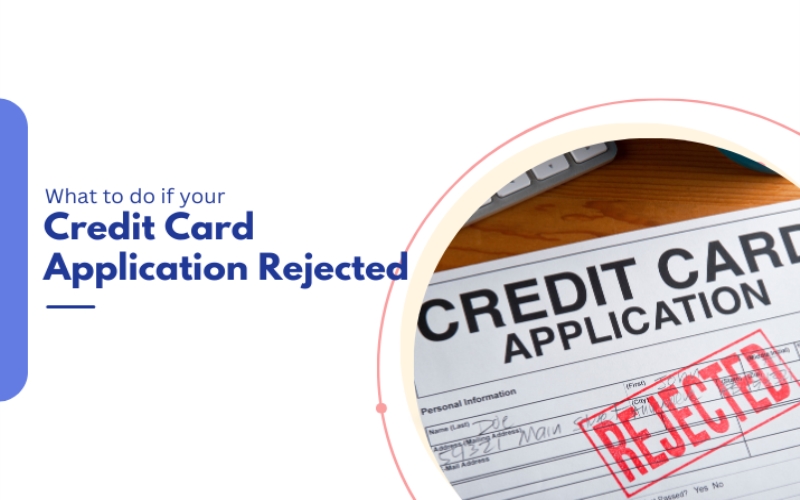When the sting of a credit card denial hits, it’s natural to feel disappointed or frustrated. It might seem like a closed door, but it’s an opportunity to reassess and take proactive steps. Due to the availability of multiple credit card providers and different types of credit cards, you can reapply for the best credit card that suits your financial needs.
In this article, we have created a comprehensive guide on what to do if your credit card application is rejected and how to boost your chances of approval.
Understanding the Denial
When you receive a credit card denial, it is necessary to comprehend that it’s not a reflection of your personal worth. Credit card issuers evaluate several factors, including credit history, income, and outstanding debt. They have specific criteria that each applicant must meet, and sometimes, an applicant may fall short in one or more areas. Understanding the denial will help you prepare better for your next application with increased chances of approval.
Get to the Root Cause
Reach out to the credit card issuer for a clear explanation of why your application was denied. In some cases, they might provide a generic reason, such as “insufficient credit history” or “low credit score.” If possible, inquire for more specific details about the factors that led to the denial. This information will guide your next steps.
Check Your Credit Report
Obtain copies of your credit reports from the major bureaus. Examine them meticulously for any inaccuracies, such as incorrect account information, inaccurate payment history, or fraudulent activities. Any errors can negatively impact your credit score and might have influenced the denial. Dispute any discrepancies you find through the bureau’s dispute process.
Work on Improving Your Credit Score
Focus on improving your credit score by adopting healthy financial habits. Start by ensuring timely payments on all your bills. Reducing outstanding debts can also positively impact your credit utilization ratio, a crucial factor in determining creditworthiness. Additionally, refrain from opening new lines of credit for the time being, as each application can temporarily lower your score.
Consider a Secured Credit Card
A secured credit card requires a cash deposit as collateral, usually equal to the credit limit. It’s an excellent option for those struggling to get approved for traditional credit cards. Responsible use of a secured card can help establish or rebuild credit history. Ensure the card reports to all three major credit bureaus to maximize its impact on your credit score.
Explore Other Options
Research credit cards specifically designed for individuals with fair or limited credit histories. Some cards may have more lenient approval criteria or lower credit score requirements. However, be cautious of high fees or interest rates associated with these cards. Evaluate and compare different options to find the best fit for your situation.
Apply for a Different Type of Card
If denied a traditional credit card, consider alternative options such as a retail store card or a gas station card. These cards might have less stringent approval requirements and can serve as a stepping stone to building credit when managed responsibly. Keep in mind the interest rates and terms associated with these cards.
Get a Cosigner or Authorized User
Having a trusted individual with good credit history cosign on a credit card application or adding you as an authorized user on their existing card can increase your chances of approval. However, ensure that both parties understand the responsibilities and risks involved, as any mishandling of the account can affect both credit histories.
Wait Before Reapplying
Resist the temptation to reapply for a credit card immediately after being denied. Multiple credit inquiries within a short period can negatively impact your credit score. Take the time to address the reasons for the denial and work on improving your credit profile before submitting another application.
Monitor Your Progress
Track your progress by regularly checking your credit score through various available services. Some credit card issuers offer free access to credit scores, or you can use reputable websites that provide monthly updates. Monitoring your score helps you gauge the impact of your efforts and identify areas that need improvement.
Consider Credit Counseling
If managing debt or understanding credit seems overwhelming, seek guidance from a reputable credit counseling agency. These professionals can assist in creating a budget, developing debt repayment strategies, and offering advice on improving financial habits. They can also provide educational resources to enhance your financial literacy.
Keep a Positive Attitude
Maintain a positive outlook throughout this process. Building credit and improving financial health take time and consistent effort. Use the denial as motivation to strengthen your financial habits and understand that setbacks are a part of the journey towards financial stability. Stay focused on your goals and celebrate small victories along the way.
Consider Diverse Financial Tools
Explore alternative financial tools beyond credit cards that can help in building credit. For instance, a credit-builder loan or a secured installment loan can diversify your credit profile. These tools function differently from credit cards but can contribute positively to your credit history when managed responsibly.
Final Thoughts
Facing a credit card denial can be disheartening, but it’s essential to remember that it’s a temporary setback, not a permanent roadblock. Your response to this situation can significantly impact your financial future. Embrace this as an opportunity to reassess your financial habits, make positive changes, and set yourself on a path toward a healthier credit profile.

